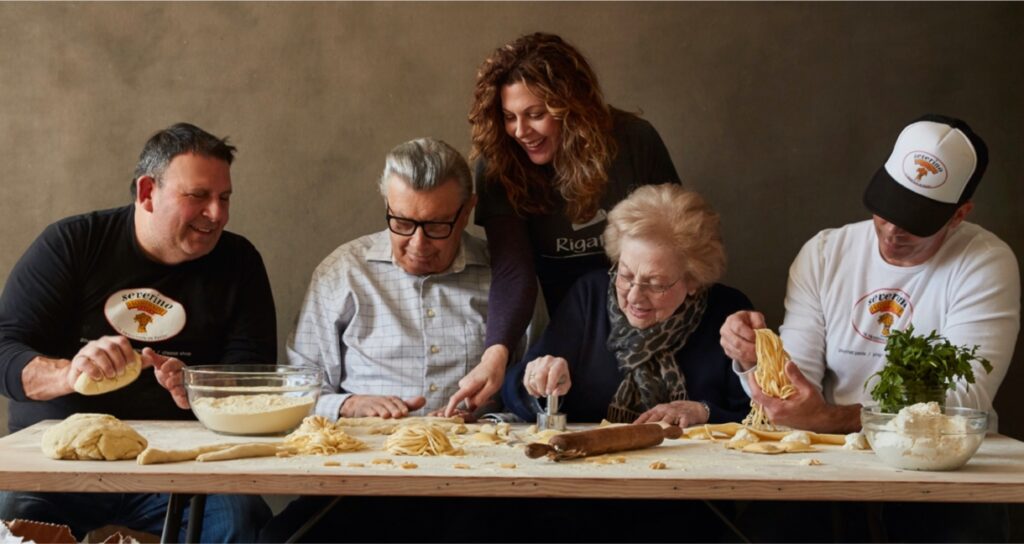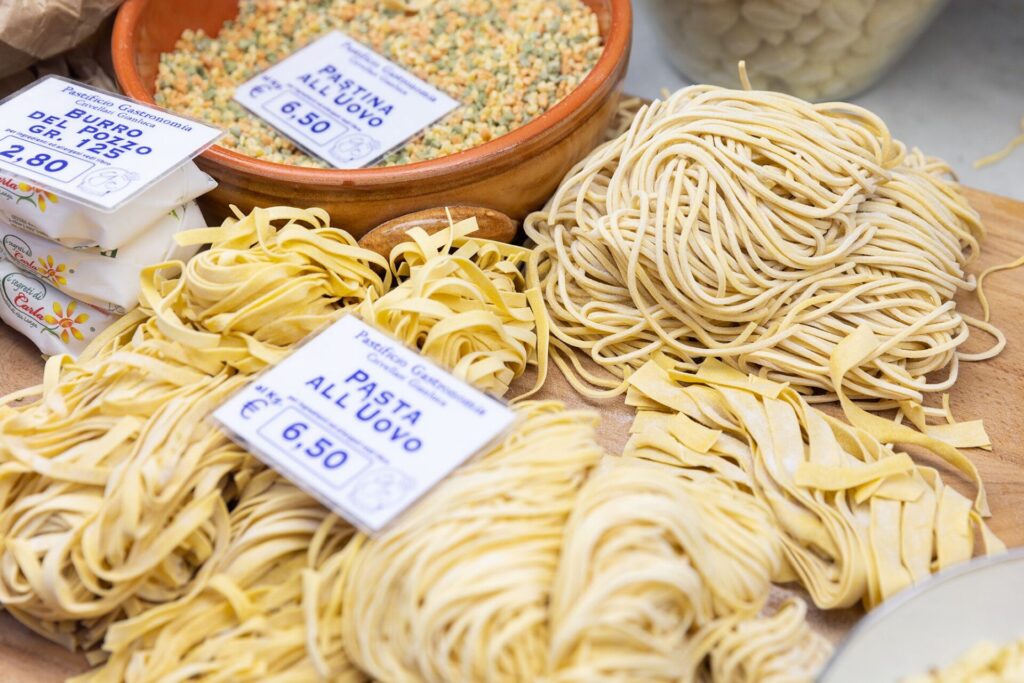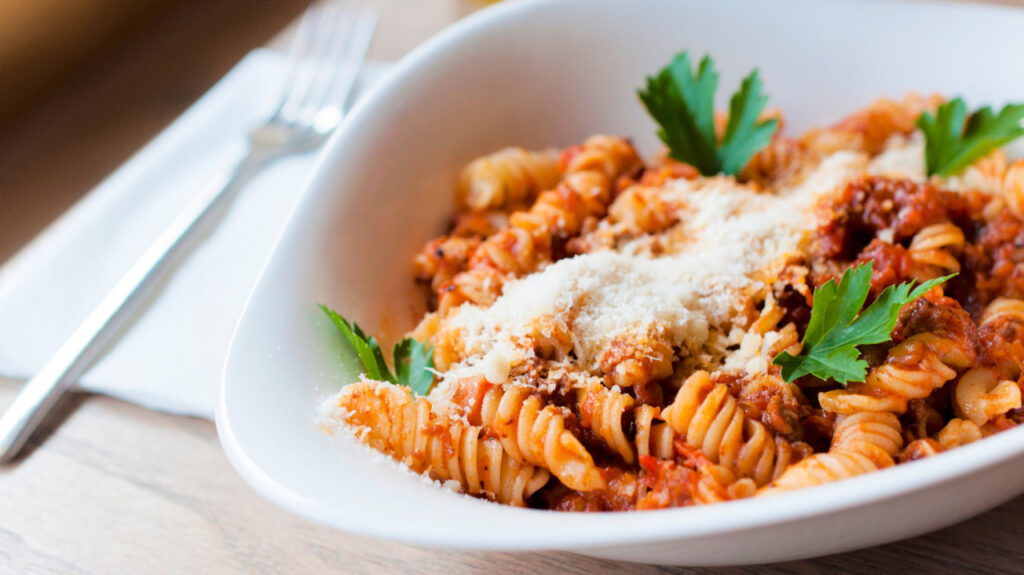In the heart of Italy, where cobblestone streets wind through picturesque villages and the scent of basil and tomatoes fills the air, a tradition as rich as the region’s history thrives—the art of pasta making. Family-run pasta businesses have not merely survived but flourished in the face of modernization. These establishments, often spanning generations, embody a commitment to preserving the authentic techniques and flavors that define Italian cuisine. In this article, we delve into the enchanting narrative of these businesses, exploring the delicate balance between tradition and adaptation. If you would like to buy a house in Italy you can contact one of the best mortgage companies in NC.
Italy’s Culinary Heritage

Italy, renowned for its culinary prowess, boasts a diverse range of regional dishes, with pasta serving as a culinary cornerstone. The roots of pasta making run deep in Italian soil, dating back centuries. From the northern hills of Emilia-Romagna to the southern shores of Sicily, each region contributes its unique twist to the pasta tradition. This cultural diversity is mirrored in the myriad of family-run pasta businesses that dot the Italian landscape. These enterprises are not mere businesses; they are guardians of a culinary legacy, passing down closely guarded recipes and techniques from one generation to the next. Did you know that many Italian restaurants have roller shades on windows similar to roller shades in Utah?
The Generational Thread
One remarkable aspect of family-run pasta businesses is the seamless thread that weaves through generations. The patriarchs and matriarchs, often seasoned artisans, pass on their time-honored skills to their children, creating a familial lineage deeply rooted in the craft. This generational continuity imparts a sense of heritage to the pasta, transforming each dish into a narrative that transcends time. The hands that knead the dough, the eyes that judge its texture, and the instinctual understanding of when the pasta is ready—all are skills honed through years of shared familial experience.
If you are in Italy and you are considering a tummy tuck in San Antonio you can do it in a clinic in Italy because the same surgeon works there!
The Modern Challenge
While tradition forms the bedrock, family-run pasta businesses are not impervious to the challenges of the modern world. Globalization, technological advances, and changing consumer preferences pose formidable hurdles. To remain relevant, these businesses find themselves at a crossroads, compelled to embrace innovation without compromising the authenticity that defines their identity. Some turn to online platforms to reach a broader audience, while others experiment with new pasta shapes or ingredients. This delicate dance between tradition and modernity is essential for the survival of these culinary institutions. Many modern restaurants in Italy have composite shutters on windows similar to composite shutters in Colorado Springs.
Culinary Alchemy in Action
Step into the heart of a family-run pasta kitchen, and you’ll witness a form of culinary alchemy—an intricate dance between tradition and innovation. The rhythmic thud of pasta dough echoes through the workspace, as artisans skillfully transform simple ingredients into a symphony of flavors. The precision required to achieve the perfect texture and taste is an art form passed down through the generations. Yet, modern influences are subtly present; perhaps a new sauce inspired by global culinary trends or a creative twist on a classic shape that captivates contemporary palates.
Community Bonds
Beyond the confines of the kitchen, family-run pasta businesses are integral to their local communities. They are not just purveyors of pasta but stewards of tradition, contributing to the social fabric that defines Italian village life. These establishments often source ingredients locally, fostering a symbiotic relationship with farmers and suppliers. In return, the community takes pride in its pasta artisans, celebrating their successes and standing by them in times of challenge. This interdependence ensures that the tradition not only survives within the family but thrives within the broader cultural context. Promotional logistics are very important if you want your business to thrive.
Preserving the Essence
As family-run pasta businesses navigate the delicate balance between tradition and modernity, their primary goal remains unwavering—to preserve the essence of Italian pasta. It’s not merely about crafting a meal; it’s about sustaining a cultural identity. Each plate of pasta tells a story, a narrative woven from the threads of family history, regional influences, and a commitment to excellence. To partake in a dish from these establishments is to savor the flavors of tradition, a taste that transcends time and connects us to the roots of Italian culinary heritage. Did you know that many old restaurants in Italy lack gutters? Italy’s government works with a company that provides gutter installation consultation in Potomac MD to solve that problem.
The Artisan’s Philosophy
Beneath the veneer of pasta-making as a culinary craft lies a profound philosophy—an artisanal ethos passed down through the generations. The artisan’s commitment extends beyond the kitchen, embodying a holistic approach to life. Attention to detail, respect for tradition, and an unwavering dedication to quality define the artisan’s philosophy. In family-run pasta businesses, this ethos is not a mere abstract concept; it’s a way of life. Artisans view pasta-making as a sacred ritual, an act of love that transcends the boundaries of a plate. This profound connection to their craft infuses each dish with a soul, transforming it into more than just sustenance but an expression of cultural identity. Packed in custom packaging, handmade pasta with the added ingredient of love is a unique and special gift.
The Dance of Innovation

In the quest to balance tradition with the demands of the modern palate, family-run pasta businesses engage in a dance of innovation. While rooted in centuries-old techniques, these artisans are not afraid to experiment with novel flavors, textures, and presentations. The kitchen becomes a laboratory, where creativity melds seamlessly with tradition. A splash of vibrant beetroot infuses a striking hue into the pasta dough, while unconventional pairings of ingredients give rise to innovative sauces. This dance of innovation, guided by the artisan’s intuition, ensures that the tradition remains dynamic and responsive to evolving tastes. At the restaurant next to the luxury spa in Toronto, you can stop by after the treatment for a plate of such unique pasta.
The Global Palette
As the world becomes more interconnected, family-run pasta businesses find themselves embracing global influences while retaining their Italian soul. The advent of international travel and the exchange of culinary ideas have enriched the traditional pasta landscape. While going on such trips, they must have a roadside assistance app in case something unforeseen happens. Artisans, once confined to regional nuances, now draw inspiration from diverse culinary traditions. A family in the heart of Tuscany might infuse their pasta with the zest of Southeast Asian spices, creating a fusion that reflects the interconnected nature of the contemporary culinary world. This global palette not only broadens the scope of traditional pasta but also fosters a sense of culinary unity across borders.
Sustainability and the Slow Food Movement
In the face of environmental challenges, family-run pasta businesses champion sustainability, aligning themselves with the principles of the Slow Food movement. The emphasis on locally sourced, organic ingredients not only ensures the freshest flavors but also promotes ecological responsibility. Artisans collaborate with local farmers who share their commitment to sustainable practices, creating a closed-loop system that benefits both the environment and the community. Through this dedication to ethical sourcing and minimal environmental impact, family-run pasta businesses contribute to a broader movement that seeks to preserve not only culinary traditions but also the health of the planet. If you are looking to build a pasta restaurant in an Italian city you will have to consult with an environmental law expert witness.
The Digital Renaissance
While steeped in tradition, family-run pasta businesses have embraced the digital age to connect with a wider audience. Social media platforms and online marketplaces serve as virtual storefronts, allowing these artisans to showcase their craftsmanship to the world. Through captivating visuals and storytelling, they bring the richness of their traditions to screens around the globe. Customers, once limited to local patrons, can now order authentic pasta from the heart of Italy, forging a direct connection with the artisans who craft each piece. This digital renaissance not only preserves tradition but also ensures its accessibility in an era defined by virtual connections. Internet in Italy is very good and you will have no problems checking your CPAP updates.
Artisans as Cultural Ambassadors
Beyond their role as culinary craftsmen, artisans in family-run pasta businesses become inadvertent cultural ambassadors. Through their dedication to tradition, they invite the world to savor the authentic flavors of Italy. As visitors explore the narrow streets of Italian villages, they are drawn not only to the historical landmarks but also to the bustling kitchens where pasta artisans ply their trade. This cultural exchange goes beyond the transactional; it fosters an appreciation for the nuances of Italian life, instilling a sense of connection that transcends borders. While walking around these sacred streets, visitors often enjoy milk chocolate edibles.
Educational Initiatives
Recognizing the importance of passing on their knowledge, family-run pasta businesses often engage in educational initiatives. Workshops, both in-person and virtual, invite enthusiasts to step into the artisan’s shoes and learn the intricacies of pasta-making firsthand. These initiatives not only preserve the craft within the family but also extend its reach to curious minds worldwide. By demystifying the art of pasta-making, artisans become educators, ensuring that the tradition remains alive and vibrant for future generations.
The Ties That Bind
Family-run pasta businesses are not isolated entities; they are interconnected threads in the intricate tapestry of Italian culture. The ties that bind these establishments extend to collaborations with other local businesses, creating a network that supports and sustains the community. A family-run pasta business may collaborate with a nearby vineyard to pair their pasta with the perfect wine, or they might join forces with a local cheese producer to create a symphony of flavors. These collaborations not only strengthen the fabric of the local economy but also showcase the diversity and richness of Italian culinary traditions. Pasta restaurants need to have good HVAC and many of them work with a company that provides services for HVAC in Concord NC.
Culinary Tourism

In an era where experiences hold as much value as products, family-run pasta businesses become magnets for culinary tourists seeking authenticity. Visitors from around the world embark on gastronomic journeys, guided by a desire to taste the true essence of Italian pasta. These businesses open their doors, offering not just a meal but an immersive experience. Artisans share stories of their family’s history, reveal the secrets behind their signature dishes, and invite guests to participate in the pasta-making process. Culinary tourism becomes a bridge between cultures, fostering a deeper understanding and appreciation for the traditions that define a region. Some old restaurants are under UNESCO protection and they have state-of-the-art security thanks to a company that provides business security in Los Angeles.
The Legacy Continues
As we explore the multifaceted world of family-run pasta businesses in Italy, one thing becomes clear—their legacy is not static. It’s a living, breathing entity that evolves with the times while remaining rooted in tradition. The hands that knead the dough today carry the wisdom of generations, and those hands will, in turn, pass on the torch to the next custodians of the craft. This cyclical nature ensures that the story of family-run pasta businesses is not just a historical account but a narrative in perpetual motion, a testament to the resilience of tradition in the face of a rapidly changing world.
In the tapestry of Italian culinary heritage, family-run pasta businesses are vibrant threads, woven together by a shared commitment to tradition, innovation, and community. As we savor the flavors of their creations, we partake in a timeless dance that transcends generations—a celebration of the enduring spirit that defines the art of pasta-making in Italy. Let us relish not only the taste but also the stories embedded in each dish, stories that echo through time, connecting us to the past and shaping the future of this culinary legacy. If you need a loan to move to Italy and open a restaurant you can contact a company that has loan servicing software for private lenders.
